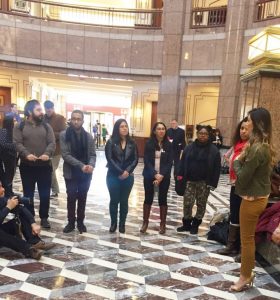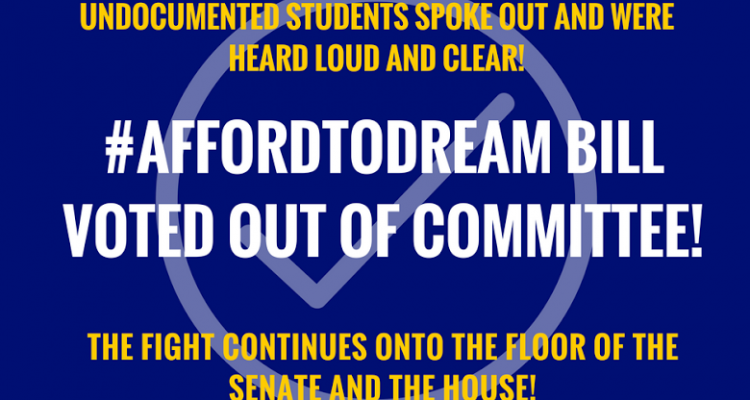By: Natalia Rojas
Undocumented Harvard University student Laura Veira recalls her fear in high school of potentially not being able to afford college because she was not eligible for institutional or federal aid. But she was rewarded for her hard work, when she received a full ride to Harvard, which is not always the case for undocumented students in this country.

#AffordToDream campaign leader Anghy Idrovo speaks to dreamers and supporters at the Legislative Building in Hartford during C4D’s “Afford to Dream” week in March. Photo: Natalia Rojas
The Connecticut For A Dream organization (C4D), made up of dreamers and supporters of immigrant students, has made it their mission to get a bill through the Connecticut legislature that will equalize institutional aid for all. C4D is currently running a campaign called #AffordToDream in hopes of convincing legislators that dreamers too deserve the chance to be able to have access to this pool of money.
“I think one of the biggest things to let legislators know is that the money given to students through institutional aid is money that should already be theirs. Undocumented students have been paying into this pool of money that is used to give aid to other students of which they don’t receive a single penny. This would not affect taxpayers,” said Veira. Undocumented students pay full tuition at public universities and their tuition dollars pay into the system that funds financial aid, she said.
On March 15, the legislative Higher Education committee voted 14-6 in favor of equalizing financial aid. A bill titled HB7000 is on its way to the House.
Among the six members who voted against HB7000 in the Higher Education committee was Republican State Senator Art Linares who represents the 33rd district, which is made up of Chester, Clinton, Colchester, East Haddam, East Hampton, Essex, Lyme, Old Saybrook, Portland, and Westbrook. Linares said the state should not reward people who break the laws and that the only issue that needs to be addressed here is the federal immigration laws.
“As the son and grandson of immigrants, I can tell you that legal immigrants are growing frustrated by the demands for funding and services made by people who did not take the legal path to this country,” said Linares.
Linares also said as the pool of people that apply for financial aid expands, the chances of receiving aid for those legally here decreases. He said this will not only impact students born in the U.S, but also students whose families immigrated legally to this country.
“By adding undocumented students to the pool of people who could receive aid, you decrease the aid or possible opportunity to receive aid for those students who are legally here,” said Linares.
Unlike Linares, Democrat State Representative Gregor Haddad who represents the town of Mansfield was the legislator who introduced HB7000 to the Higher Education committee and believes this bill is necessary for qualified undocumented students.
According to Haddad’s website, he said, “the bill would ensure that all college students who pay into the institutional aid fund can access it for financial need, if they have demonstrated need, and without being disqualified because of their immigration status.”
This will be C4D’s third attempt in the past three years to try to get a similar bill through the Connecticut General Assembly. Last year, C4D’s bill reached the senate, but it did not receive enough votes.
“This time around, we are more organized and more powerful than ever,” said Eric Cruz Lopez, the event coordinator at C4D. Cruz Lopez is widely known across the state for his speeches in support of immigration. Just like Veira, Cruz Lopez was able to get a full ride to the University of Connecticut, but he is aware that not many students have that same opportunity.
If this bill does not pass again, Dreamers will continue fighting for their education. Most undocumented students tend to go to community colleges for two years and then transfer over to a four year university. Though this is the more affordable method, it is a struggle and it takes students years of work to be able to save up money for when it is time to transfer over to a university like UConn.
“I was originally accepted to go to UConn, but I could not afford tuition and dorming. I am currently going to community college and working on the side,” said Maricarmen Hernandez, an undocumented Mexican student at Manchester Community College. “There are times when working one job is not enough and I have to ask my parents for help,” she said.

C4D event coordinator Eric Cruz Lopez at UConn. Photo: Natalia Rojas
This is also the case for Laura Veira’s brother, who did not receive a full ride to any four year university.
Veira’s brother is expected to graduate from Norwalk Community College next semester, but he is not too sure if he wants to apply to a four year university. Paying for community college was very difficult itself and he is not sure he could afford a four year university by working 25 hours a week at a minimum wage job, his sister said.
“I am happy to see my brother getting an education even if it may not have been exactly what he wanted. I like to see him keep moving forward with his education, but I know that he is having a much harder time being able to get through it when he has to work to help my parents with the bill,” said Veira.
Many undocumented students become discouraged at the community college stage and drop out without even getting their associate’s degree. Working long hours to be able to afford community college already takes away from the time they need to spend worrying about their grades and assignments. Several dreamers can’t fathom the thought of having to pay to go to a university like UConn.
“This bill could have the ability to make a huge difference in several motivated students’ lives across the state. One of those students would be my brother,” said Veira.


